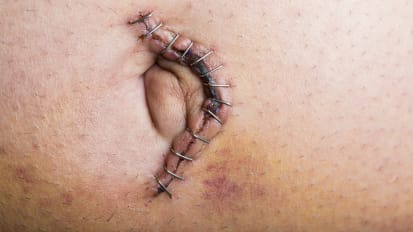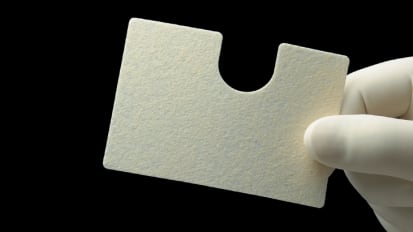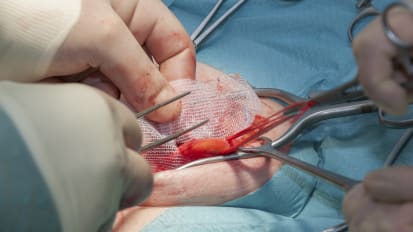
 Document
Document
Expert Review: Clinical experience with GORE® SYNECOR Intraperitoneal Biomaterial
A surgeon reviewing their clinical experience with GORE® SYNECOR Intraperitoneal Biomaterial and MEDTRONIC PARIETEX Composite Mesh for Umbilical / Epigastric Hernias. Video
Video
Laparoscopic Fixation of GORE® SYNECOR Biomaterial in a Cadaver Model Using a Robotic Arm
Erik B. Wilson M.D., FACS, shares a video showing laparoscopic fixation of GORE® SYNECOR Biomaterial in a cadaver model using a robotic arm. Document
Document
Clinical Performance with Staple Line Reinforcement: Scientific Literature Analysis
Clinical Performance of GORE® SEAMGUARD® Bioabsorbable Staple Line Reinforcement. Document
Document
20 Years of Clinical History: Minimizing Complications, Maximizing Outcomes
Partner with a proven leader in reducing risks and raising the standard for bariatric and hiatal / paraesophageal hernia surgery. Document
Document
The Role of a Biosynthetic Hybrid Mesh in Abdominal Wall Hernia Repair in High-Risk Patients with Multiple Comorbidities
The influx of more high-risk and obese patients in need of abdominal wall hernia repair naturally leads to larger, more complex hernia cases and the need for strong mesh. Document
Document
Comparison of laparoscopic sleeve gastrectomy leak rates in four staple-line reinforcement options: A systematic review
The study compared laparoscopic sleeve gastrectomy (LSG) staple-line leak rates of 4 prevalent surgical options: No reinforcement, oversewing, nonabsorbable bovine pericardial strips (BPS) and absorbable polymer membrane (APM). Document
Document
Clinical Use of GORE® BIO-A® Tissue Reinforcement in Ventral Hernia Repair Using the Components Separation Technique
Many repaired incisional or ventral hernias recur; thus, the primary objective of research and technological developments pertaining to these hernias has long been to minimize recurrences without increasing treatment-related complications. Document
Document
Biosynthetics — Know your options
"[Biologic] materials come with only moderate durability, and at substantial financial cost. Slowly absorbable biosynthetic implants, as a class of hernia meshes, represent a possible cost-effective solution. In the final analysis." Video
Video
Clinical Experience with GORE® SYNECOR Intraperitoneal Biomaterial
Donald Cugini M.D., presents a case using GORE® SYNECOR Intraperitoneal Biomaterial for umbilical hernia repair.![Retromuscular Hernia Repair Using GORE<sup>®</sup> SYNECOR Preperitoneal Biomaterial with Transfascial Suture Fixation [Full Version]](http://res.cloudinary.com/broadcastmed/image/fetch/q_auto,c_fill,w_413,h_232,g_faces:center,f_auto/http%3A%2F%2F55933%2Dbcmed%2Es3%2Eamazonaws%2Ecom%2Fbcp%2Fimages%2ForlVideoAssets%2FimgSource%2Fwlg%5F0024%2Epng) Video
Video
Retromuscular Hernia Repair Using GORE® SYNECOR Preperitoneal Biomaterial with Transfascial Suture Fixation [Full Version]
John P. Fischer, M.D., MPH, FACS, is a specialist in abdominal wall reconstruction. This is a surgical technique video demonstrating a retromuscular repair using GORE® SYNECOR Preperitoneal Biomaterial with transfascial fixation. Video
Video
GORE® BIO-A® Web Technology Innovation
Learn more about the GORE® BIO-A® Web Technology, and how it works as a scaffolding to help the body grow vascularized soft tissue. Document
Document
Quality of Life in Ventral and Hiatal Hernia Repair: Review of Long-Term Patient Outcomes in Two Large Case Series
A fundamental goal of hernia repair is providing a durable closure.